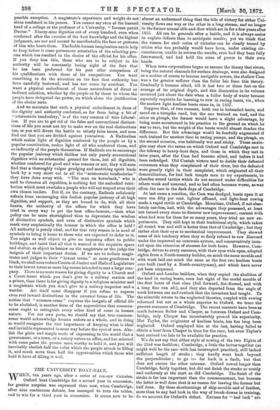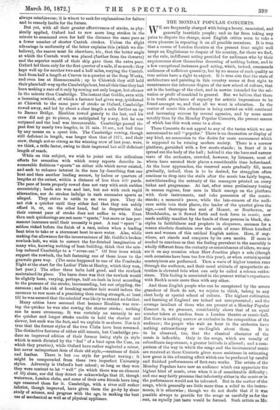THE UNIVERSITY BOAT-RACE.
WHEN, ten years ago, after a series of see-saw victories, Oxford beat Cambridge for a second year in succession, far greater surprise was expressed than now, when Cambridge, after nine continuous defeats, has managed to turn the tables, and to win for a third year in succession. It seems now to be almost an understood thing that the tide of victory for either Uni- versity flows one way or the other in a long stream, and no longer in the former annual ebb-and-flow which eet in for a few years after 1855. All can be generals after a battle, and it is always easier to explain defeats than to anticipate results; yet we think that the reason for each series of victories can be clearly traced by critics who too_ probably would have been, under existing cir- cumstances, unable to reverse the results, even had they been fully forewarned, and had held the reins of power in their own hands.
When town corporations began to assume the theory that rivers, being the natural channels for surface drainage, were also designed as a matter of course to become navigable sewers, the shallow Cam was a far greater sufferer than the fuller Isis from this theory. Gradually it became silted, till it lost two or three feet on the average of its original depth, and this diminution in its volume occurred just about the date when a fuller body of water became especially requisite for learning to row in racing boats, viz., when the modern light keelless boats came in, in 1857.
Suppose that, of two runners, both ran in hobnailed boots, and raced on a turnpike road, but the one trained on turf, and the other on plough, the former would have a slight advantage, by being more accustomed in his practice to the ground on which he was to race, but the weight of the boots would almost deaden the difference. But this advantage would be fearfully augmented if each trained for another time in racing pumps, and the plough, on the second occasion, was habitually wet and sticky. These analo- gies may show the terms on which Oxford and Cambridge met in the tideway in heavy-boat days, and those in which they met in later years, after the Cam had become silted, and before it had been redredged. Old Cantab. victors used to deride their defeated successors when they complained of their river, but the defeated were greatly right in their complaint, which originated all their demoralization, for bad luck tempts men to try experiments, to abandon sound tactics which do not succeed under difficulties for others weak and unsound, and so bad often becomes worse, as was often the case in the dark days of Cambridge.
At last came a reaction, the Cam was dredged, boats upon it at once ran fifty per cent. lighter offhand, and light-boat rowing made a rapid stride at Cambridge. Meantime, Oxford, if not abso- lutely careless, had, with the advantages they possessed, at least not turned every atone to discover new improvement; content with what had won for them for so many years, they tried no new ex- periments. They still kept to their traditional style, which taken all round was and still is better than that of Cambridge ; but they rather shut their eyes to mechanical improvement. They showed some of this tendency when they so flatly refused to row Harvard under the improved no-coxswain system, and conservatively insis- ted upon the retention of steerers for both fours. However, Cam- bridge, driven to every resource, with their eyes wide open, adopted eights from a North-country builder, on much the same moulds and with work laid out much the same as the first two keelless boats ever built (and by a North-countryman), and which have never yet been surpassed.
Oxford and London builders, when they copied the abolition of the keel in racing boats, soon lost sight of the model moulds of the first boats of that class (fall forward, flat-floored, and with a long fine run aft), and they also departed from the angle of work between oar and rowlock that the inventors had taught. To the scientific return to the neglected theories, coupled with rowing reformed but not as a whole superior to Oxford, we trace the present successes of Cambridge. The recent contests have been as much between Salter and Clasper, as between Oxford and Cam- bridge, only Clasper has incontestably proved his superiority. Mat Taylor, the originator of keelless boats, has too long been neglected. Oxford employed him at the last, having failed to obtain a boat from Clasper in time for the race, but even Taylor's boat arrived too late to be available for practice.
We do not say that either style of rowing of the two Eights of the 23rd was faultless ; Cambridge, a little the better together (as might well be the case with less interrupted practice), still lacked sufficient length of stroke ; they hardly went back beyond the perpendicular ; to go too far back is a fault, but that does not excuse the other extreme. Oxford rowed longer than Cambridge, fairly together, but did not finish the stroke so neatly and uniformly at the start as did Cambridge. The finish of the stroke is far less important than the commencement, but because the latter is well done that is no reason for leaving the former but half done. By these shortcomings of ship-moulds and of feather, more than to any bad luck in the way of break-downs in training, do we account for Oxford's defeat. Excuses for "bad luck" are
always mischievous; it is wisest to seek for explanations for failure and to remedy faults for the future.
But yet, with all their greater effectiveness of stroke, as phy- sically applied, Oxford had to row more long strokes in the minute to command even for half the distance the same pace as a fewer number of shorter Cantab. strokes. Unless the slight advantage in uniformity of the latter explains this (which we dis- believe), the reason must lie elsewhere, viz., that the better angle at which the Cantab. work was placed (farther from the thwarts) and the superior mould of their ship gave them the extra pace. Oxford led them only for the first quarter of a mile, if 80 much; they kept well up for another two and a half miles, varying the Cantab. lead from half a length at Craven to a quarter at the Soap Works, and even less at Hammersmith ; up to Chiswick they still held their place half-way up the Cambridge boat, but all this time they had been making a race of it only by rowing not only longer, but oftener in the minute than Cambridge. The instant that Goldie, even with a loosening rowlock, of which a fastener had given way, quickened at Chiswick to the same pace of stroke as Oxford, Cambridge rowed away, and led by about a clear length a mile further on up to Barnes Bridge. Houblon rowed gamely to the last, and his crew did not go to pieces, as anticipated by many, but he was outpaced and the lead was irrecoverable. Cambridge passed the post first by nearly two lengths, in 21 min. 16 sec., not bad time by any means on a spent tide. The Cambridge rowing, though still deficient in length, was longer than that of 1871, and their crew, though not so strong as the winning crew of last year, were, we think, a trifle faster, owing to their improved but still deficient length of reach.
While on this subject, we wish to point out the ridiculous efforts for sensation with which many reports describe in- numerable fictitious "spurts" on either aide which never existed, and seek to enhance interest in the race by describing first one boat and then another leading seesaw, by halves or quarters of lengths at the outset, within a distance of less than 400 yards. The pace of boats properly rowed does not vary with such sudden eccentricity; leads are won and lost, but not with such rapid alternation, nor do strokes indulge in such successive spurts as alleged. They strive to settle to an even pace. They do not risk a quicker until they either feel that they can safely afford it, or, on the other hand, feel in desperation that their current pace of stroke does not suffice to win. Even then such quickenings are not mere "spurts," but more or lees per- manent increases until their necessity is past. A real " spurt " is seldom risked before the finish of a race, unless when a leading boat tries to take or a sternmost boat to save water. Also, while making due allowance for the inconvenience of Mr. Goldie's broken rowlock-bolt, we wish to correct the far-fetched imagination of many who, knowing nothing of boat-building, think that the mis- hap reduced Cambridge to a "seven-oar." Of four irons which support the rowlock, the bolt fastening one of these irons to the gunwale gave way. (The same happened to one of the Pembroke Eight at the start for the Ladies' Plate at Henley, which they won, last year.) The other three bolts held good, and the rowlock maintained its place. The harm done was that the rowlock would be slightly loose, varying, perhaps, half-an-inch in level according to the pressure of the stroke, incommoding, but not crippling, the oarsman ; and the risk of breaking another bolt would induce the oarsman to row more of a practising than racing strength, at least till he was assured that the mischief was likely to extend no further.
Many critics have assumed that because Houblon was row- ing the quicker he was also rowing the shorter stroke ; nothing can be more erroneousf It was certainly an anomaly to see the quicker and longer stroke unable to hold the shorter and slower, but such was the fact, and we explain it as above. Nor is it true that the former styles of the two Clubs have been reversed. The distinctive features of either still remain, but Cambridge pro- duce an improved edition of their former losing style (a style which is much dictated by the " feel " of a boat upon the Cam, on which they practise), while Oxford have rather neglected a minor, but never unimportant item of their old style,—neatness of finish and feather. There is but one style for perfect rowing ; it might be compounded from these two imperfect University styles. Adversity is Oxford's best school ; so long as they won they were content to let " well " (in which there was an element of ill) alone, nor did they detect or acknowledge that ill, though watermen, London clubs, and some of their own friends have long ago censured them for it. Cambridge, with a river still rather inferior, though improved, have given them the go-by by sheer study of science, and progress with the age, in making the best use of mechanical as well as of physical appliance.



































 Previous page
Previous page